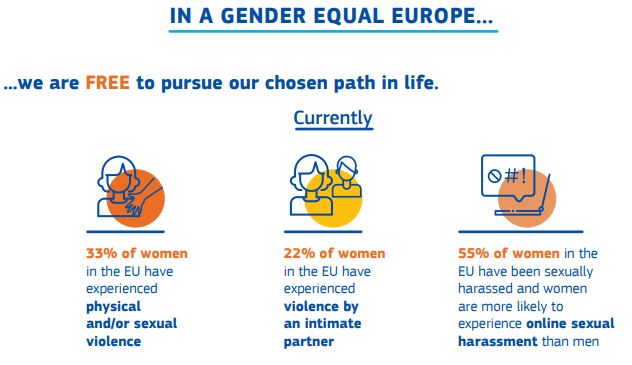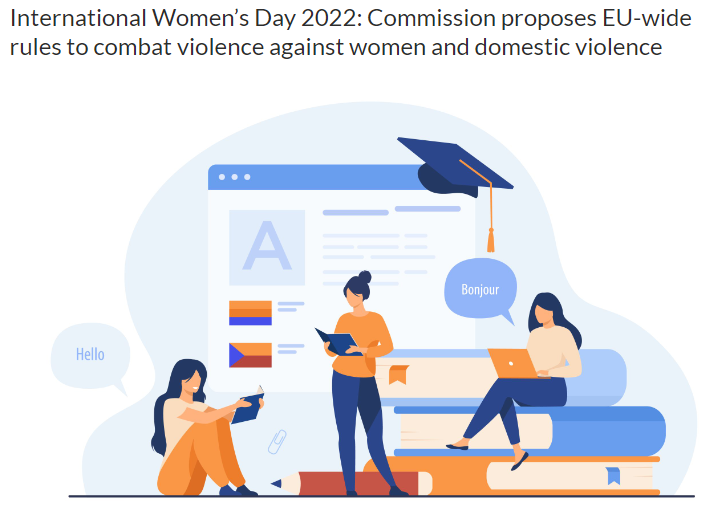Commission proposed EU – wide rules to combat violence against women and domestic violence
Despite the lack of reliable and comparable data, available figures generally show that women are often the prime victims of domestic violence (According to the figures most commonly cited, around 90% of the victims of domestic violence in the EU are women, see e.g., The European Institute for Gender Equality – EIGE, 2012).
Globally, an estimated 736 million women, almost one in three, have been subjected to physical and/or sexual intimate partner violence, non-partner sexual violence, or both at least once in their life (30 per cent of women aged 15 and older). This figure does not include sexual harassment. Most violence against women is perpetrated by current or former husbands or intimate partners. Globally, violence against women disproportionately affects low- and lower-middle-income countries and regions (World Health Organization, on behalf of the United Nations Inter-Agency Working Group on Violence Against Women Estimation and Data, 2021).
Violence against women and domestic violence are pervasive throughout the EU and are estimated to affect 1 in 3 women in the EU. One in two have experienced sexual harassment. One in 20 women report having been raped. Online violence is also on the rise, targeting in particular women in public life, such as journalists and politicians. 1 in 2 young women experienced gender-based cyber violence. Women also experience violence at work: about a third of women in the EU who have faced sexual harassment experienced it at work (2022 edition of the European Commission’s annual report on gender equality in the EU).

In March of 2022, the European Commission proposed EU-wide rules to combat violence against women and domestic violence. The proposed Directive will criminalise rape based on lack of consent, female genital mutilation and cyber violence, which includes: non-consensual sharing of intimate images; cyber stalking; cyber harassment; and cyber incitement to violence or hatred. The new rules also strengthen victims’ access to justice and encourage Member States to implement a one-stop shop mechanism, meaning that all support and protection services would be located in the same place. The victims should be able to claim compensation in the course of criminal proceedings. The proposal also calls for adequate and specialised protection and support, for instance, through free of charge helplines and rape crisis centres. It also provides for targeted support for groups with specific needs or at risk, including women fleeing armed conflict.

The key elements of the proposed new rules:
- Criminalisation of rape, female genital mutilation, and cyber violence
The Commission is proposing to criminalise the following offences across the EU: (i) rape based on the lack of consent; (ii) Female Genital Mutilation (FGM); (iii) cyber stalking;(iv) non-consensual sharing of intimate images; (v) cyber harassment; and (vi) cyber incitement to hatred or violence. The proposal complements the Digital Services Act (DSA) making it operational by defining illegal online content related to cyber violence. It will also allow for quick judicial proceedings to have relevant online content removed swiftly. - Safe reporting and risk assessment procedures
The proposal tackles the underreporting of violence against women that still exists today. It introduces new ways to report acts of violence, which are gender-sensitive, safer, easier, more accessible – including online – and child-friendly. Professionals, such as healthcare workers or psychiatrists, would no longer be hindered by confidentiality regimes to report any reasonable suspicions of an imminent risk of serious physical harm. Authorities would also be obliged to conduct individual risk assessments when the victim first makes contact, to assess the risk posed by the offender. On this basis, authorities would need to provide immediate protection through emergency barring or protection orders. - Respect for victims privacy in judicial proceedings and right to compensation
The Commission is proposing that evidence or questions relating to the victims’ private life, especially their sexual history, can only be used when strictly necessary. Victims would have the right to claim full compensation from offenders for damages, including the costs of healthcare, support services, lost income, physical and psychological harm. They should also be able to obtain compensation in the course of criminal proceedings. - Support for victims through helplines and rape crisis centres
To address the very specific needs of victims of sexual violence, the Commission is proposing that Member States provide dedicated services including rape crisis centres. Victims at an increased risk of violence, including women fleeing armed conflict, should receive targeted support from Member States. National helpline to support victims of violence against women and domestic violence should be made available 24/7, all year round, and be free of charge. When a victim is a child authorities should provide age-appropriate support in the best interests of the child. Victims of cyber violence will also be entitled to adequate support, including advice on how to seek legal help and how to remove online content. In cases of sexual harassment at work, external counselling services should be made available for victims and employers. - Better coordination and cooperation
Member States should exchange best practices and consult each other in criminal cases, including via Eurojust and the European Judicial Network. To track progress and monitor the situation in all Member States, the Commission is also proposing an obligation on Member States to collect data on violence against women and domestic violence to feed into an EU-wide survey every five years.
The need to prevent and combat violence against women, protect victims and punish offenders was announced in President von der Leyen’s Political Guidelines as a key priority for the Commission, and is part of the Gender Equality Strategy 2020-2025. As part of the Commission’s ongoing work to tackle gender-based violence and promote equality and under the new €1.55 billion Citizens, Equality, Rights and Values funding programme, in 2022 €30.5 million is now available for projects preventing and combatting violence against women and children as well as €6.8 million for projects promoting women’s full enjoyment of their rights, freedom from gender stereotypes, work-life balance, women’s empowerment and gender mainstreaming. (EU-wide rules to combat violence against women, europa.eu)
